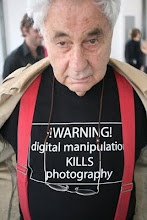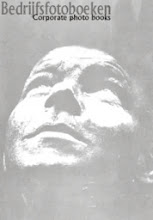By Matt Damsker
FROM FAIR TO FINE: 20TH CENTURY
PHOTOGRAPHY BOOKS THAT MATTER
with Nobuyoshi Araki, Richard Avedon, Werner Bischof, Brassaï,René Burri, Harry Callahan, Robert Capa, Larry Clark, Robert Doisneau, William Eggleston, Walker Evans, Robert Frank, Lee Friedlander, Paul Fusco, Ralph Gibson, Peter Hujar, György Kepes, André Kertész, Josef Koudelka, Les Krims, Jens Liebchen,Susan Meiselas, Ryuji Miyamoto, Richard Misrach, Ken Ohara,Martin Parr, Ed Ruscha, Sebastião Salgado, Aaron Siskind, Stephen Shore, Susan Sontag, Alec Soth, Ralph Steiner, Joel Sternfeld, Paul Strand, Hiroshi Sugimoto, Larry Sultan, Wolfgang Tillmans,Weegee , William Wegman, Brett Weston, Minor White, Garry Winogrand ...
By Stephen Daiter, John Gossage, Jess Mott. Published by the Stephen Daiter Gallery. 340 pages, more than 200 exhibits. Stephen Daiter Gallery, 311 West Superior, Suite 404, Chicago, Ill. 60610. Information: +1-312-787-3350; email:info@stephendaitergallery.com .
By almost any standard, this Daiter Gallery exhibition of photography books has it all: breadth, depth, and a scholarly commitment to contextualize the emergence of the fine-art photo book as an art form unto itself, differentiated from the often famous individual images collected in the books. And yet, reading through the insightful essays that pace this catalogue--from photographer/collector John Gossage, or Professor Alex Sweetman, or collector David Tippit, among others--it becomes apparent that the best and most enduring of these bound portfolios speak volumes for themselves, without much need for big-picture explication. Photography being the most democratically accessible of art forms, it's only natural that it would come to inhabit the book world of mass distribution with none of the uneasiness that attends to mass-produced images of, say, great painting or sculpture.
Indeed, it's fair to say that photographs were meant to be passed around, and in codex they often achieve the sort of comprehensiveness and continuity that can otherwise only be achieved by a carefully curated exhibition. Thus, the large-format, in-your-face ambition of, say, Richard Avedon's novelistic 1985 "In the American West," which was conceived as much for publication as for the gallery wall, is an arguable apotheosis of the photo book form--a masterwork that achieves much more the longer you live with it, contending and commiserating with its hardscrabble characters (as I have for so long) than it could possibly achieve any other way.
In contrast, such other classics as 1972's "Diane Arbus" collect images that have taken on a mythic singularity--the identical twins, the sensual dwarf, the domesticated giant--and matter more as necessities of the medium than as sweeping concepts. Of course, sandwiched between the conceptual coin that pairs Arbus and Avedon are photo books of a teeming variety, and the Daiter exhibit collects wonderful examples of the rare and the truly readable. Alphabetically, the roll call moves almost magically, continuing from Baltz to Bullock, to Cartier-Bresson's 1949 first edition of "New-York," to Larry Clark's renegade explorations of "Teenage Lust" and "Tulsa," to Eggleston, Walker Evans, Friedlander, the groundbreaking art books of Ed Ruscha, and so on.
Ultimately, what Daiter delivers with this book and exhibition is a succession of reasons why photography is the once and future mode of revelation, and why photography books so are marvelously attuned to the medium. One need only consider the unique, accordion-fold continuity of Ken Ohara's "Self Portrait: 365 Diary" of 1972, which reminds us that long before the Internet gave us the power to upload and blog our pajamaed selves across the universe, visionary photographers were already experimenting with comparable notions of intimacy, immediacy, and connectivity.
If anything, "From Fair to Fine" could dig a little deeper with each example: many of the books are presented with brief descriptions that give us an idea of what sets them apart or makes them classic, but too many of them go undescribed (other than for some vital statistics). A shame, since this microcosmic book of books makes us want to know everything that lies between its many covers.
Matt Damsker is an author and critic, who has written about photography and the arts for the Los Angeles Times, Hartford Courant, Philadelphia Bulletin, Rolling Stone magazine and other publications. His book, "Rock Voices", was published in 1981 by St. Martin's Press. His essay in the book, "Marcus Doyle: Night Vision" was published this past November.
From Fair to Fine 2(Paperback)


Van_der_Elsken.jpg)
















Geen opmerkingen:
Een reactie posten